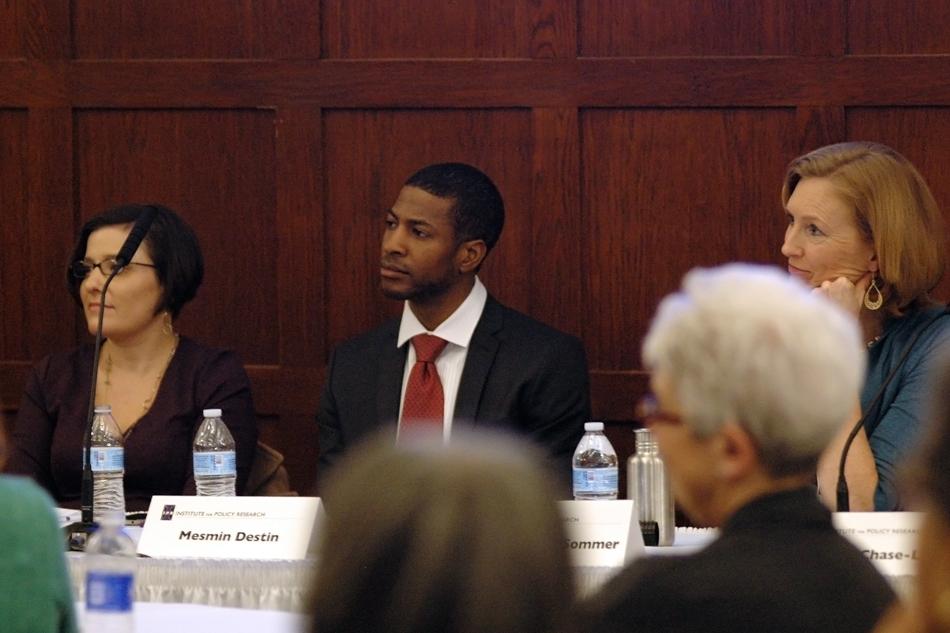Northwestern researchers discuss two-generation programs
Julian Gerez/The Daily Northwestern
Northwestern researchers Sara Goldrick-Rab, Mesmin Destin and Teresa Sommer discuss advancing the education and income of parents and children simultaneously through two-generation programs. More than 100 people, including Mayor Elizabeth Tisdahl, attended the briefing.
April 16, 2014
More than 100 people, including Mayor Elizabeth Tisdahl and State Rep. Robyn Gabel (D-Evanston) attended a talk Wednesday evening by Northwestern researchers about advancing the education and income of parents and children simultaneously through two-generation programs.
The briefing, which featured speakers from the NU Institute for Policy Research and was held at Evanston Township High School, followed an announcement in February that the Evanston Community Foundation and the IPR would collaborate on a two-generation pilot program in Evanston.
(Foundation launches 2-generation program)
Speakers discussed the challenges facing parents completing educational degrees, how income disparities in families can affect children and difficulties with repaying student loans.
Sara Goldrick-Rab, a social policy professor at the University of Wisconsin-Madison said “once upon a time” the cost of going to college was reasonably low, but that has shifted dramatically.
“Today about 75 percent of Americans are finding it hard to afford even a public four-year institution,” she said. “Under that system, it no longer seems so progressive to take our limited resources and distribute them across all types of schools and across all years of education.”
Two-generation programs, those that link education and job training for low-income parents with high-quality education for young children, are the solution that speakers advocated for to create educational success and economic security.
Lindsay Chase-Lansdale, a human development and social policy professor at NU, said two-generation programs will be more successful than simply having children in early childhood education alone.
“The two-generation programs that target parents and children simultaneously will have a greater short-term and long-term impact on children’s success and life opportunities over time,” Chase-Lansdale said.
Two-generation programs already exist in 22 out of 50 states according to Ascend at the Aspen Institute, a hub that is investing in these programs nationwide, including the pilot in Evanston run by NU and ECF, Dance Marathon’s secondary beneficiary for 17 years.
Teresa Eckrich Sommer, a 20-year citizen of Evanston and an IPR researcher said Evanston is a good place for this program because of its many initiatives to help “increase connections between early learning and elementary school and increase the engagement of parents across the lifespan of their children’s education.”
David Figlio, the director for the IPR and a NU professor of education and social policy, said the program can be fruitful.
“It’s clear that the challenges are very great, but it’s also clear that the opportunities are very great,” he said. “Ultimately, it’s really about trying to help to make sure that everybody has a chance and as great of an opportunity as possible.”
Email: [email protected]
Twitter: @JGerez_news


